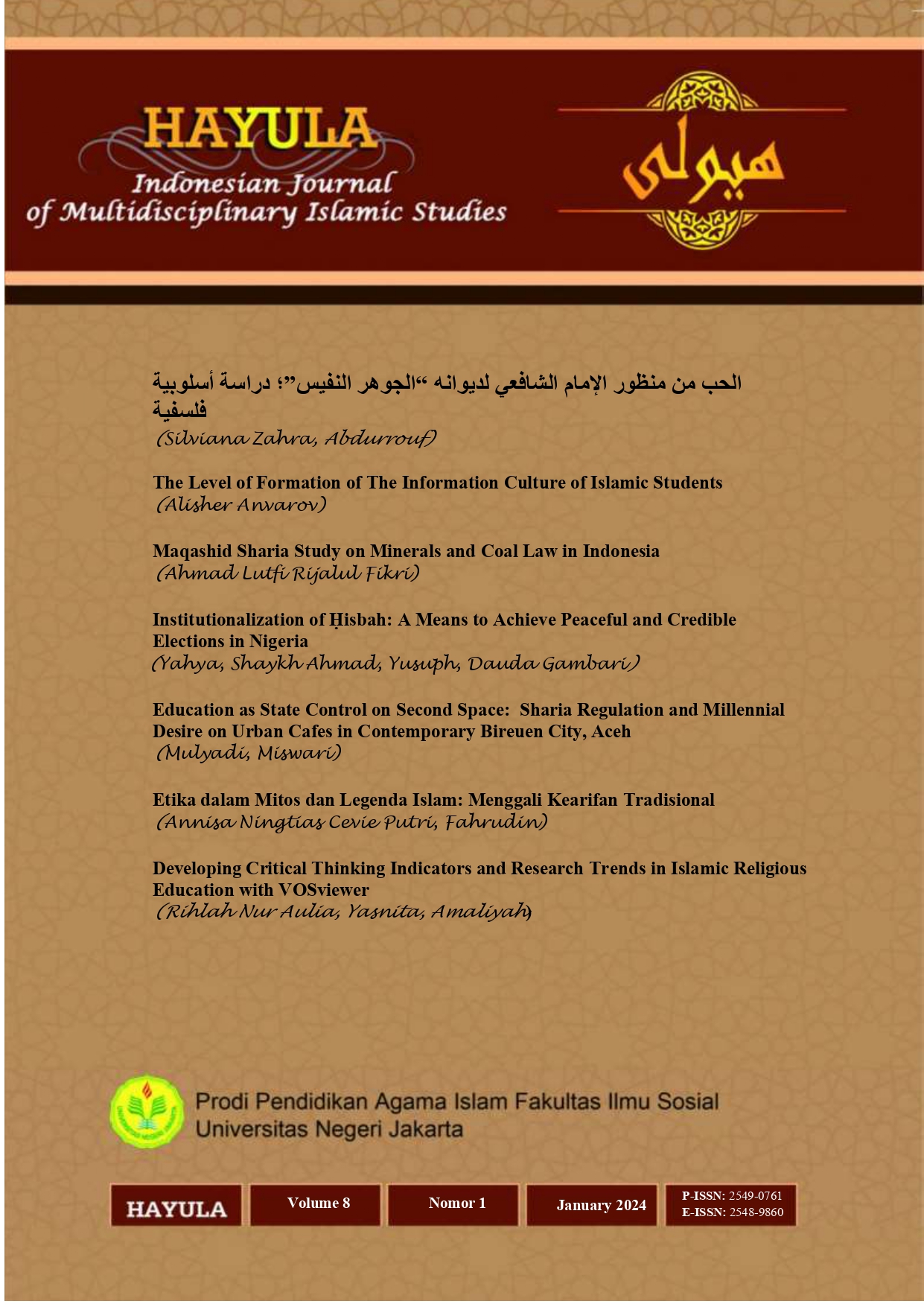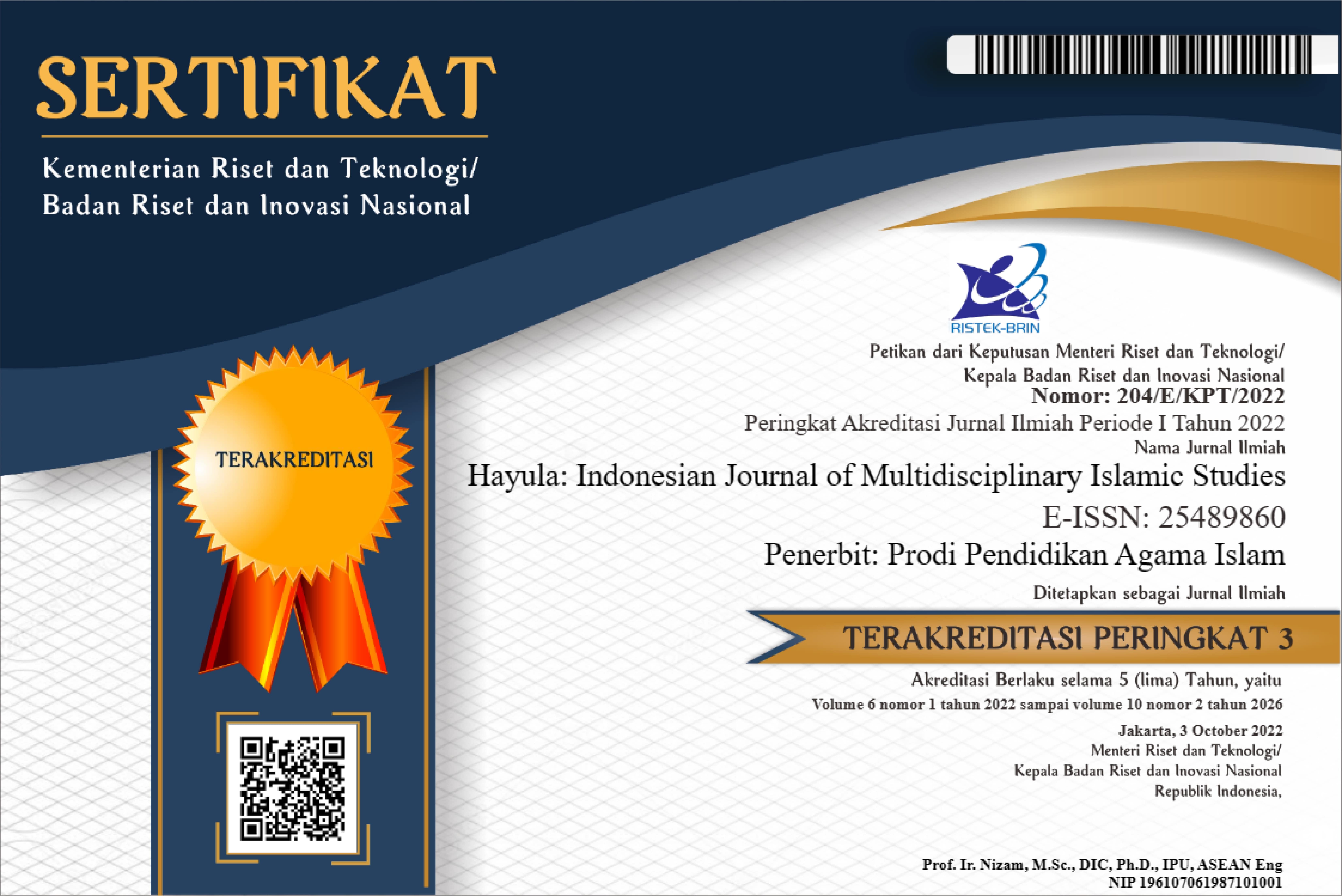Non-Muslim Khalwat in Qonun Jinayat in Aceh, Indonesia: Discourse on Islamic Sharia and Human Rights
DOI:
https://doi.org/10.21009/hayula.009.01.01Keywords:
Good Law, Non-Muslim, Unlawful Seclusion (khalwat)Abstract
In this article, we examine the application of Aceh Qanun No. 6/2014 on the law of jinayat against acts of khalwat committed by non-Muslims. The aim of the research is to analyse the legal provisions for non-Muslims who commit acts of khalwat based on the provisions of the Qanun Jinayat. This type of research is normative jurisprudence. It uses a deductive approach. The sources of data chosen will be both primary and secondary data. The primary source of data is the Aceh Qanun No. 6/2014 on the Jinayat Law. Meanwhile, the secondary sources of data consist of various books, articles, magazines, and various pieces of information related to the Khalwat movement in Aceh. The result of this research is that non-Muslims who engage in khulwat, whether with Muslims or not, are subject to the applicable provisions of Qanun Aceh No. 6/2014 and do not need to be given the freedom to choose whether to be tried under the Qanun Jinayat or the national law (KUHP). Khalwat crimes are not specifically regulated by the national law (KUHP). The punishment for non-Muslims who commit khalwat is uqubat ta'zir caning up to 10 times or paying a fine of up to 100 grams of pure gold or imprisonment for up to 10 months. With the application of Islamic law to non-Muslims who violate the laws of jarimah, the provisions of which are not regulated in the National Law (KUHP), the Aceh Qanun will continue to cause controversy both nationally and internationally.
References
Abbas, S. (2018). Philosophy of Islamic Sharia Implementation in Aceh. Banda Aceh: Aceh Manuscript & UIN Ar-Raniry.
Abubakar, A. Y. (2005). Islamic Sharia in Naggroe Aceh Darussalam Province, Policy and Activity Paradigm. Banda Aceh: Islamic Shari'at Office of NAD Province.
Abubakar, A. (2020). The Position of Non-Muslims in Qanun Jinayat. Banda Aceh: Aceh Islamic Sharia Office.
Abubakar, A., & Lubis, Z. (2019). Aceh Jinayat Law: An Introduction. Jakarta: Kencana.
Abubakar, A. (2007). Islamic Criminal Law in NAD Province. Banda Aceh: Islamic Shari'at Office of Nanggroe Aceh Darussalam Province.
Aceh, Regional Government. (2014). Qanun Aceh Number 6 of 2014 concerning the law of Jinayat. Aceh Islamic Sharia Office. Retrieved December 13, 2023, from https://www.regulasip.id/book/8964/read
Alamsyah, I. E. (2014, September). Aceh House of Representatives: Qanun Jinayat applies to non-Muslims, if... Republika Online.
B., Space. (2017). The position of Qanun Aceh reviewed from the aspects of history, regulation, function, and content of Qanun. Scientific Journal of Advocacy, 5(1), 17–33. https://doi.org/10.36987/jiad.v5i1.317
Arifin, M. (2015). Criminal acts against khalwat perpetrators according to the Qanun of Nanggroe Aceh Province Number 14 of 2003. Al-Fikrah Journal, 4(1), 6–36.
Berutu, A. G. (2020). Fiqh Jinayat (Islamic Criminal Law) complemented by the discussion of Qanun Jinayat Aceh. Purwokerto: CV. Pena Persada.
Delimunthe, D., & Siregar, S. (2022). The law of whipping for non-Muslims applied based on the judge's decision in the Sharia Court. West Pasaman: CV. Azka Pustaka.
Delta, R. (2016). The issue of controversy over the implementation of Qanun Jinayah after the enactment of the Special Autonomy Law of Nangroe Aceh Darussalam Province. Justicia Science: Journal of Legal Sciences, 1(1), 29–43. https://doi.org/10.24967/jcs.v1i1.98
Djumala, D. (2013). Soft power for Aceh: Conflict resolution and decentralization politics. Jakarta: PT Gramedia Pustaka Utama.
Efendi, S. (2024). Transformation of Islamic criminal law in modern society in Aceh. Al-Qanun: Jurnal Kajian Sosial dan Hukum Islam, 5(2), 41–49. https://doi.org/10.58836/al-qanun.v5i2.21513
Gayo, A. A. (2017). Legal aspects of the implementation of Qanun Jinayat in Aceh Province. De Jure Journal of Legal Research, 17(2), 131–154. https://doi.org/10.30641/dejure.2017.v17.131-154
Hasan, M., & Saebani, B. A. (2013). Islamic criminal law. Bandung: Pustaka Setia.
Institute for Criminal Justice Reform (ICJR). (2014). ICJR: Qanun Jinayat results in the degradation of Indonesia's criminal law and adds to Indonesia's burden in the international anti-torture forum. Retrieved December 19, 2024, from https://icjr.or.id/icjr-qanun-jinayat-mengakibatkan-kemunduran-hukum-pemidanaan-indonesia-dan-menambah-beban-indonesia-di-forum-anti-penyiksaan-internasional/
Institute for Criminal Justice Reform (ICJR). (2016). Application for objection to Qanun Aceh No. 6 of 2014 concerning Jinayat law. Retrieved December 22, 2024, from https://icjr.or.id/permohonan-keberatan-terhadap-qanun-aceh-no-6-tahun-2014-tentang-hukum-jinayat/
Ikhwan, M., & Daudy, M. H. (2019). Institutionalization of Jinayat law in Aceh as part of the Indonesian criminal law system. Islam Universalia: International Journal of Islamic Studies and Social Sciences, 1(2), 180–212. https://doi.org/10.56613/islam-universalia.v1i2.119
Ismail, A. (2013). The position of Islamic Sharia in Aceh in the framework of the national legal system. Aceh: CV. BieNa Edukasi.
Junaidi, Y. (2012). Religious and state relations: Redefinition of constitutionalism discourse in Indonesia. Cianjur: IMR Press.
Ministry of Education and Culture, Inspectorate General. (2023). Acehnese culture, getting to know the land of the Porch of Mecca closer. Retrieved December 17, 2024, from https://itjen.kemdikbud.go.id/web/kebudayaan-aceh-mengenal-lebih-dekat-negeri-serambi-mekah/
Mafazi, S. S. (2022). The enforcement of Aceh's Sharia customary law for non-Muslim Acehnese residents. Lex Generalis Law Journal, 3(6), 490–496. https://doi.org/10.56370/jhlg.v3i6.274
Malay, H. A., Abubakar, M. Z., & Nasir, N. C. M. (2021). Minorities in the Shari'a territory: The position of non-Muslims in Aceh's Jinayat law. Legitimacy: Journal of Criminal Law and Political Law, 10(1), 129–149. https://doi.org/10.22373/legitimasi.v10i1.10521
Muksalmina, M. R. S., Yulis, S., & Subaidi, J. (2023). Khalwat in the study of Islamic criminal law and its resolution according to Qanun Jinayat Aceh. SEIKAT: Journal of Social, Political and Legal Sciences, 2(4), 435–441. https://doi.org/10.55681/seikat.v2i4.806
Nurdin, A., Chaidar, A., Nazarudidin, T., & Puteh, A. A. (2018). Socio-religious movements. Lhokseumawe: Unimal Press.
Nurdin, R. (2018). The position of Qanun Jinayat Aceh in Indonesia's national criminal law system. MIQOT: Journal of Islamic Sciences, 42(2), 356–378. https://doi.org/10.30821/miqot.v42i2.542
Nurhalizah, M. E. (2023, November). Non-Muslims and the application of Islamic law in Indonesia. Nursyam Centre.
Panjaitan, E. M. L., & Tjandra, H. (2022). The practice of public flogging in the perspective of international human rights in Nanggroe Aceh Darussalam Indonesia. Jurnal Hukum dan Peradilan, 11(1), 93–108. https://doi.org/10.25216/jhp.11.1.2022.93-108
Women, Institute for Criminal Justice Reform and Solidarity. (2016). Application for objection to Qanun Aceh No. 6 of 2014 concerning Jinayat law. South Jakarta: Institute for Criminal Justice Reform.
Praja, S. J., & Ulfa, W. (2020). Implementation of Qanun Number 6 of 2014 concerning Jinayat law in Banda Aceh City, Aceh Province. Journal of Government Policy, 3(1), 11–20. https://doi.org/10.33701/jkp.v3i1.1071
Qotadah, H. A., & Achmad, A. D. (2020). Qanun Jinayat Aceh between implementation, issues, and challenges. Adliya: Journal of Law and Humanity, 14(2), 171–194. https://doi.org/10.15575/adliya.v14i2.9246
Rahman, A. (2020). Islamic Sharia-based government system in Indonesia (Case study of the implementation of Qanun Jinayat in the Aceh provincial government). KAIS Social Science Studies, 1(2), 91–106. https://doi.org/10.24853/kais.1.2.91-106
Rahman, D. A., Abubakar, M. B., Rizwan, M., Muntasir, & Hidayat, B. (2024). Autonomy of the special region of Aceh: A bridge to reconciliation or a new source of tension. Journal of Government and Politics, 9(3), 183–194. https://doi.org/10.36982/jpg.v9i3.4459
Rosida, I. A., & Hariri, A. (2023). The enforcement of whipping sanctions, Qanun Jinayat in Aceh in the perspective of human rights. Media of Law and Sharia, 4(2), 115–129. https://doi.org/10.18196/mls.v4i2.6
Roslaili, Y. (2021). Formalization of Islamic criminal law in Indonesia: Case study of Qanun Jinayah in Aceh. Sukabumi: CV. Footprint.
Salim, A. (2017). Jarimah Khalwat in the territorial Aceh (Analysis of the application of the criminal code and Qanun Jinayah Aceh Number 6 of 2014). Ar-Raniry State Islamic University.
Sucondro, B. (2022). Legal aspects of the application of Qanun Jinayat in the Pancasila paradigm. Criminal Law and Legal Development, 5(1), 63–84. https://doi.org/10.25105/hpph.v5i1.16246
Susantri, Y., & Hidayat, R. (2020). Regional regulations, Qanun, and Perdasi in the national legal system. Syiah Kuala Law Journal, 4(1), 33–44. https://doi.org/10.24815/sklj.v4i1.16595
Aceh Government Editorial Team. (n.d.). History of Aceh Province. Retrieved December 17, 2024, from https://acehprov.go.id/halaman/sejarah-provinsi-aceh
Yani, M. (2011). The implementation of Jinayat law in Aceh in the perspective of Fiqh and human rights: A study of Qanun Number 12, 13, and 14 of 2003. UIN Syarif Hidayatullah Jakarta: Postgraduate School.
Downloads
Published
How to Cite
Issue
Section
License
Copyright (c) 2025 Muhammad Yunus Hidayatullah, Nur Rohmah, Kenneth Sulthon Alafi Al-Hallaj , Abdul Kadir Riyadi (Author)

This work is licensed under a Creative Commons Attribution 4.0 International License.
Authors who publish with this Journal agree to the following terms:
- Author retain copyright and grant the journal right of first publication with the work simultaneously licensed under a creative commons attribution licensethat allow others to share the work within an acknowledgement of the work’s authorship and initial publication of this journal.
- Authors are able to enter into separate, additional contractual arrangementfor the non-exclusive distribution of the journal’s published version of the work (e.g. acknowledgement of its initial publication in this journal).
- Authors are permitted and encouraged to post their work online(e.g. in institutional repositories or on their websites) prior to and during the submission process, as it can lead to productive exchanges, as well as earlier and greater citation of published works.
Users/public use of this website will be licensed to CC BY







